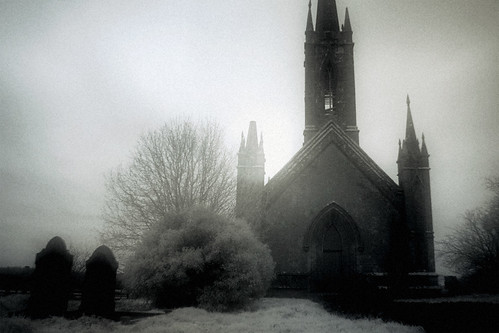Lewis describes faith not as an emotion or a mood but as a "habit." It is something that you develop by training, practice, and exercise. Faith, in this sense, can be compared to the habit of shooting free throws. If you want to be a good free throw shooter, you must practice, that is, you must shoot hundreds of free throws day in and day out. This takes discipline: anyone who practices free throws only when he or she is in the right mood will surely not become a good free throw shooter. The one who attends to the practice everyday, in spite of one's moods, will eventually shoot a high percentage foul shot. It is the same with faith: faith is a habit which comes by way of disciplined practice.
Practicing faith, according to Lewis, includes something very specific: "Once you have accepted Christianity, then some of its main doctrines shall be deliberately held before your mind for some time every day. We have to be continually reminded of what we believe" (Ibid., 142). Lewis goes on to say that most people who leave Christianity do not do so because they have reasoned their way out of Christianity, but rather because they have not kept the faith alive in their minds.
Worship, among many things, is a time when we are continually reminded of what we believe. It is a time when we are trained into the faith. We are reminded of what we believe through music, scripture reading, preaching, and the Eucharist. All of these things are practices. By attending to them with discipline, we develop the virtue of faith. These practices enable us to "hold on to things that our reason once accepted, in spite of our changing moods." Worship, in this vein, is more like a habit than an emotional experience. To be sure, there are times when worship will powerfully evoke our emotions. There are times when we will be in the mood to worship. There are also times, however, when we will not feel like worshipping. There are times when worship does not evoke emotions. That is okay. Worship is not about our ever-changing emotions but rather about being continually reminded of and shaped by the story of God reconciling the world to himself in Christ. By attending to that story day in and day out, in the midst of our various emotional states, we will acquire the virtue of faith.
Reciting the creeds over and over in worship is one of the best ways to remind ourselves of our beliefs. Jaroslav Pelikan, one of the greatest church historians of our time, was once asked why we need to recite creeds in worship. Pelikan said that our spiritual life fluctuates: there are ups and downs, hot spots and colds spots. Therefore, during Sunday morning worship, we are not asked, "As of 10:30 am, what do you believe?" Rather, we are asked "Do you choose to be part of community which has affirmed these things?" The creeds set for the basic things that the church catholic has affirmed throughout space and time. By reciting the creed continually--by practicing it over and over--we are able to keep the faith over the long haul.
 The Contemporary Era: Part 3
The Contemporary Era: Part 3
 All of us have been disillusioned with Christian community. All of us have had dreams of what the church ought to be, and all of us have had those dreams shattered by the harsh realities of life together. Dietrich Bonhoeffer knew about disillusionment. After all, he lived during the "German-Christian compromise," a time when most of his brothers and sisters in Christ swore allegiance to Hitler. What is striking about Bonhoeffer, however, is that he did not wallow in his
All of us have been disillusioned with Christian community. All of us have had dreams of what the church ought to be, and all of us have had those dreams shattered by the harsh realities of life together. Dietrich Bonhoeffer knew about disillusionment. After all, he lived during the "German-Christian compromise," a time when most of his brothers and sisters in Christ swore allegiance to Hitler. What is striking about Bonhoeffer, however, is that he did not wallow in his  The Contemporary Era: Part 2
The Contemporary Era: Part 2

 The Modern Era
The Modern Era Where do we see love of neighbor in Brother Lawrence's vision of the spiritual life? Brother Lawrence describes the spiritual life in terms of a "general loving awareness of God." Does such constant, loving awareness of God exclude awareness of neighbor? Is the neighbor simply an interruption or distraction to one's contemplation of God?
Where do we see love of neighbor in Brother Lawrence's vision of the spiritual life? Brother Lawrence describes the spiritual life in terms of a "general loving awareness of God." Does such constant, loving awareness of God exclude awareness of neighbor? Is the neighbor simply an interruption or distraction to one's contemplation of God?
 The Reformation Era: Part II
The Reformation Era: Part II